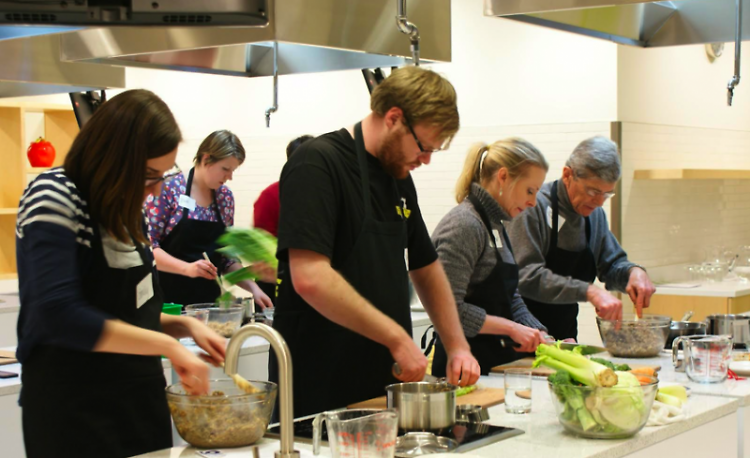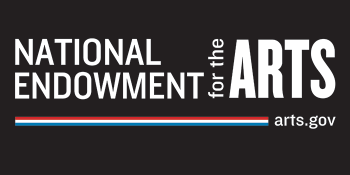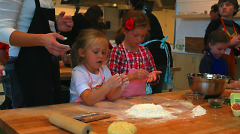The great abundance and expansive resources of our industrialized food system has brought with it so many options. Americans today spend more than $1 trillion on food, but less than one percent of our food budget is within our local community.
In the eleven county area that makes West Michigan, there are 12,200 farms. The Downtown Market sees the greatest opportunity of our community is making better food decisions, because food that is grown in our region is better for the environment and the West Michigan economy.
While most residents know the Downtown Market as a place to purchase delicious food, either grown locally, or produced using local ingredients by expert artisans, they may not know it is also a destination for learning about the food we eat.
The Grand Rapids Downtown Market has made it their mission to help residents learn about what we eat, where it comes from and the effect it has on our bodies. Education takes on more than one form in this Heartside foodie destination. From public classes and seminars for startup businesses to partnerships with local educational institutions, learning is part of the fun.
Classes for the Public
Nearly every night of the week, there is at least one class going on at the Downtown Market. From cooking classes for kids and teens to chef’s tasting dinners, the educational classes offered in the Market’s Demo Kitchen and Teaching Kitchen are great for adults, families, date night or even a ladies’ night on the town.
Shannon Sadoski, education manager of culinary and health and wellness classes at the Market, says she works hard to program a wide variety of classes for different age groups and interests. “Some people want to get very hands-on in a specific topic, like vegetarian cooking or juicing, while others want to learn from a chef demonstrating how to prepare a gourmet meal from fresh local ingredients. We have opportunities for both.”
“Health and wellness education is critical for people to understand why locally grown food is better for the economy and healthier for your body,” said Mimi Fritz, president and CEO of the Market. “We also want to be sure people know how to prepare the fresh produce and meat they purchase at the Market to make their own healthy meals.”
A new “Discover the Market” series features classes presented by Market Hall Vendors, such as Malamiah Juice Bar and Spice Merchants. Each month, a vendor will present a topic that makes his/her business special, revealing recipes, secret techniques, and specialty items shoppers can't find anywhere else.
To ensure everyone has access to classes at the Market, a program partnered with Spectrum Health helps low-income individuals take advantage of the education opportunities as well. Residents can apply online for financial assistance for classes by submitting one form of income verification, and receive not only class tuition scholarships but vouchers to be used for produce at the Market as well.
A full schedule of January- March classes are available online, and includes “Couples Paella Party,” “Breakfast Pajama Party for Kids” and “Cooking with Herbs and Spices.”
Incubator Kitchen Education
In addition to classes for the general public, the Downtown Market offers educational opportunities and open office hours for entrepreneurs who want to learn about starting a food-related business. Crystal LeCoy, Incubator Kitchen Coordinator, says, “Our goal is for food businesses to ‘graduate’ from our incubator program with a viable, sustainable business plan and the knowledge and experience needed to grow out of the incubator kitchen and into a brick and mortar location. We provide resources and mentorship opportunities that guide entrepreneurs through business planning and development, food safety, licensing, packaging, distribution, marketing strategies, resource sharing, and networking in efforts to aid businesses through the often overwhelming process of being a startup."
Beginning January 21, a three-part distribution series hosted by the Market will educate existing food businesses and entrepreneurs looking to create startup companies, and is free to attend. The series, explores the ins and outs of wholesale in grocery and large-scale food distribution, including regulations and best practices, and provides opportunities to learn from buyers for area retail and distribution companies, as well as representatives from organizations such as West Michigan FarmLink.
Real Life, Real Learning: Students at the Downtown Market
The Kent Career Technical Center offers high school students in Kent County educational opportunities at the Downtown Market. Approximately 100 juniors and seniors of the Kent Intermediate School District work in the Downtown Market Incubator Kitchen to build and hone professional culinary skills.
Some of those students stay in the program for a third year, receiving an associates degree upon completion when partnered with classes at Ferris State University. KISD aims to provide students advancement in technical careers, and the Incubator Kitchen contributes by providing a safe learning environment for those looking to work in a professional commercial kitchen.
Over the course of the program, students acquire the nationally recognized Servsafe Certification and gain skills in food safety and preparation, advanced culinary and pastry arts, and hospitality; including running a restaurant and bakery and catering special events.
Coming soon, Grand Valley State University will begin construction of their new 350-square-foot space in the lower level of the Market’s education wing. There, students and faculty will work on food and nutrition, as well as other health and community-related projects. GVSU will use this space as its hub for outreach and collaborative research beginning in 2014.
The Rapidian, a program of the 501(c)3 nonprofit Community Media Center, relies on the community’s support to help cover the cost of training reporters and publishing content.
We need your help.
If each of our readers and content creators who values this community platform help support its creation and maintenance, The Rapidian can continue to educate and facilitate a conversation around issues for years to come.
Please support The Rapidian and make a contribution today.



